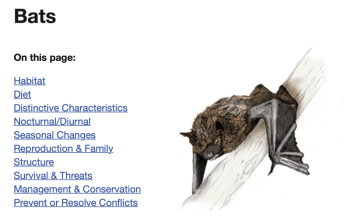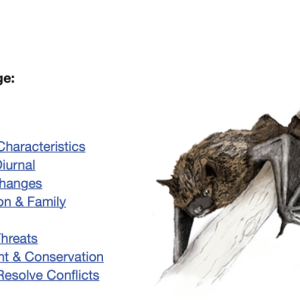Bats are busy now: Maine CDC advises caution, maintain distance
The Maine Center for Disease Control and Prevention (Maine CDC) urges Maine residents and visitors to take steps to prevent rabies exposure by limiting contact with bats, it said in a July 31 news release.
Bats are most active in Maine from midsummer to early September, though bat exposures can happen at any time of year. The Maine CDC encourages people to be cautious around bats, keep a safe distance, and know what to do after exposure to a bat.
Per the Maine CDC:
Bats play an important role in the environment but can spread viruses such as rabies. Rabies can be fatal in humans, pets, and livestock. Human rabies cases are rare in the United States, and Maine last reported a human rabies case in 1937. In 2024, bats made up 43 percent of the 667 animals tested by the Maine CDC and 10 bats tested positive for rabies.
Rabies spreads when infected mammals bite and, in some cases, scratch other mammals. The virus can also spread through contact with an infected mammal's brain or spinal cord. Rabies cannot spread in blood, urine, feces, skunk spray, or dried saliva. A rabid animal may show a variety of symptoms or no symptoms at all. Wherever possible, avoid contact with wildlife, including bats, or any animals you do not know.
Determining whether exposure to a bat occurred may be difficult. Assess each exposure on a case-by-case basis and always treat bats with caution. A bat exposure may include:
- Bites
- Scratches
- Handling a bat without gloves
- Waking up with a bat in the room
- Finding a bat in a room with an unaccompanied child or incapacitated adult
- Pets and livestock holding a bat in their mouths, or found in the same area as the bat (like a living room or barn)
"Rabies post-exposure treatment is effective at preventing rabies for people bitten by a rabid animal. However, this usually involves a series of five shots and can be expensive. To minimize treating people unnecessarily, the Maine CDC recommends these steps if you find a bat in your home or workplace:
- Capture the bat safely. Do your best to safely trap the bat. Only release the bat outdoors if you are certain the bat did not have contact with people or pets. If unsure, call the Maine CDC before releasing the bat.
- Submit the bat for rabies testing. If a bat exposure occurs, contact the Maine Warden Service. Call your local animal control officer if a warden is not available. They will pick up the bat and transport it for rabies testing.
- Seek health care. If bitten or scratched, wash the wound with soap and warm water for 10-15 minutes. Contact a health care provider. You can prevent getting rabies after a bat exposure with rabies post-exposure prophylaxis (rabies PEP). In most cases, you can wait until lab results come back for the tested animal to start rabies PEP. Your health care provider will help make the decision to begin or stop rabies PEP.
- Protect pets and livestock. Talk to a veterinarian if bats have contact with pets or livestock. Keep your pets and livestock up to date on rabies vaccination to protect them and help reduce or eliminate quarantine times.
- Bat-proof buildings. The best way to prevent rabies is to prevent contact with rabid animals. Take steps to remove or prevent bats from entering your home or building.
For more information:
- Maine CDC Rabies webpage
- Maine Inland Fisheries and Wildlife Bats webpage
- Maine CDC's disease reporting & consultation line: 1-800-821-5821 (available 24/7)
- Maine IF&W Game Warden Dispatch Centers (for bat pick-up and delivery)
- Augusta: 1-800-452-4664
- Bangor: 1-800-432-7381
- Houlton: 1-800-924-2261
- Maine Inland Fisheries and Wildlife Regional Offices





























